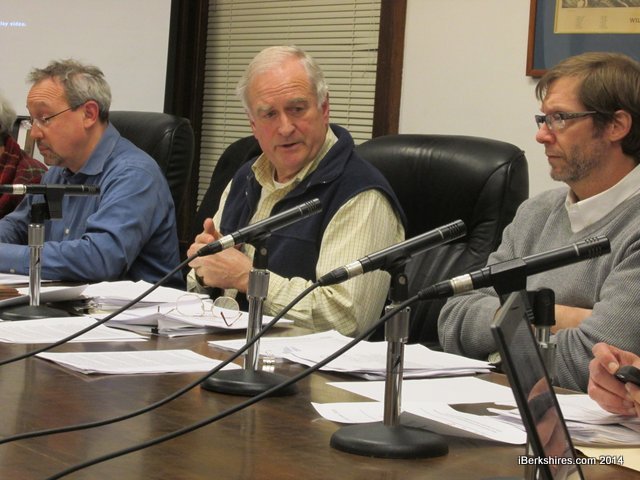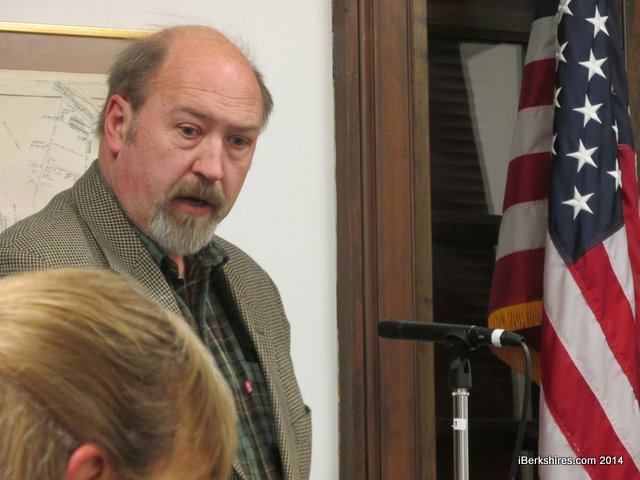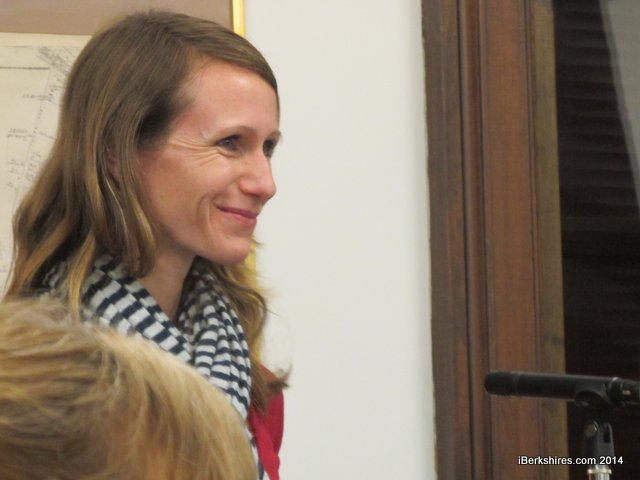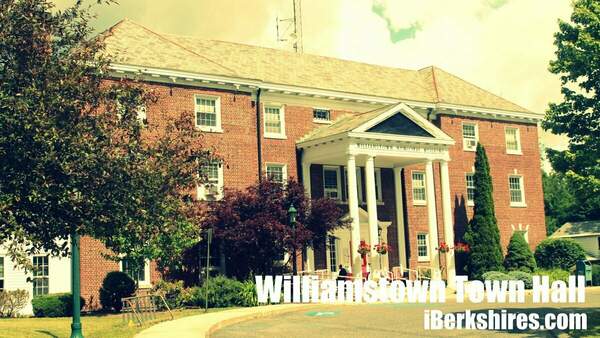Williamstown Community Preservation Panel OKs Five of Six Applicants
 |
|
 |
The board rejected Minerva Arts Center's request for funds to create a park space at the Main Street site despite Executive Director Edward Cating's, left, presentation. |
WILLIAMSTOWN, Mass. — The Community Preservation Committee on Tuesday approved five of the six applications it received for funding from the town's Community Preservation Act funds.
Just two projects received the unanimous support of all seven members of the eight-person panel in attendance.
And the committee deferred until its Feb. 25 meeting discussions of how much it will recommend town meeting allot to each of the projects it did approve.
Chairman Philip McKnight reiterated that it is likely the town will not have enough CPA funds to support all of the requests in their entirety.
The lone project that was defeated on Tuesday — a request for $175,000 to fund open space preservation at the planned Minerva Arts Center on Main Street — fell on a vote of 6-1.
Minerva Arts Executive Director Edward Cating made the case for the project to the committee, emphasizing that the money sought by the center would go toward community gardens, trails and outdoor improvements on the parcel the arts center intends to buy.
Cating presented the committee with documentation outlining the long-term sustainability of the planned arts center. But he said even if the full project is delayed because the capital campaign takes longer than expected, the improvements envisioned for the property would benefit Williamstown residents right away.
"We are in a position of acquiring this property to sustain it from current rents and leases and sales from the [secondhand store] there," Cating said. "We have time to [raise money]. We can sustain the facility as it is now. That's not our goal, but it's something we could do.
"We could use the existing property and later the improved property to give residents access to the land and the Hoosic River."
Nevertheless, committee member Jeffrey Thomas, who voted against all but two of the applications, pressed Cating on the issue of timing of the request.
"I would like to give you the opportunity to respond to the big question I have, which is I don't understand why you need this funding for open space for the project now," Thomas said. "I feel it's a cart-before-the-horse type of issue here. I want to invite you to make the argument why we should fund the open space component now while other aspects are in the formative stages.
"What's the urgency of the open space now?"
"I'd turn that around and ask, 'What's the urgency of doing the performance space first?' " Cating said. "We have parallel parts of the project."
Cating said MAC would be agreeable to an offer of CPA funds that was contingent on spending the town funds last — after the capital campaign is completed.
"It wouldn't be our first choice," he said. "We want to move on every phase now."
Committee member Andrew Hogeland cast the lone vote in favor of the Minerva Arts application.
 Williamstown Historical Museum Director Sarah Currie addresses the committee. Williamstown Historical Museum Director Sarah Currie addresses the committee. |
Thomas was the lone dissenter in votes to approve to affordable housing requests on Tuesday's agenda: a $75,000 request from the Affordable Housing Trust to fund a pilot program of acquiring and rehabilitating single-family homes or duplexes that could be rented at affordable rates or sold below market value with deed restrictions; and a $100,000 request from Berkshire Housing Development Corp., the developer of the Highland Woods senior housing project planned for land donated by Williams College.
Thomas was joined by Chairman Philip McKnight in voting against a $75,000 request from the Affordable Housing Trust for unrestricted funds that would allow the trust to fund unforeseen projects in a timely fashion without waiting for town meeting each spring.
Last year, McKnight argued against a $200,000 allocation of CPA funds to the trust on the reasoning that the committee normally approves funds for specific projects.
Two projects passed without objection of any of the members present: a $17,571 request from the Williamstown Historical Museum to support conservation and curatorial research and a $68,000 request from the Williamstown Rural Lands Foundation to help preserve 220 acres of farmland under the commonwealth's Agriculture Preservation Restriction program.
The Community Preservation Act was enacted in Williamstown in 2002. Properties are levied a 2 percent sales tax surcharge (exempting the first $100,000 in valuation) to support the CPA fund, which is augmented by state matching funds.
Town Meeting ultimately decides whether to make the allocations recommended by the CPC.
Tags: CPA,















